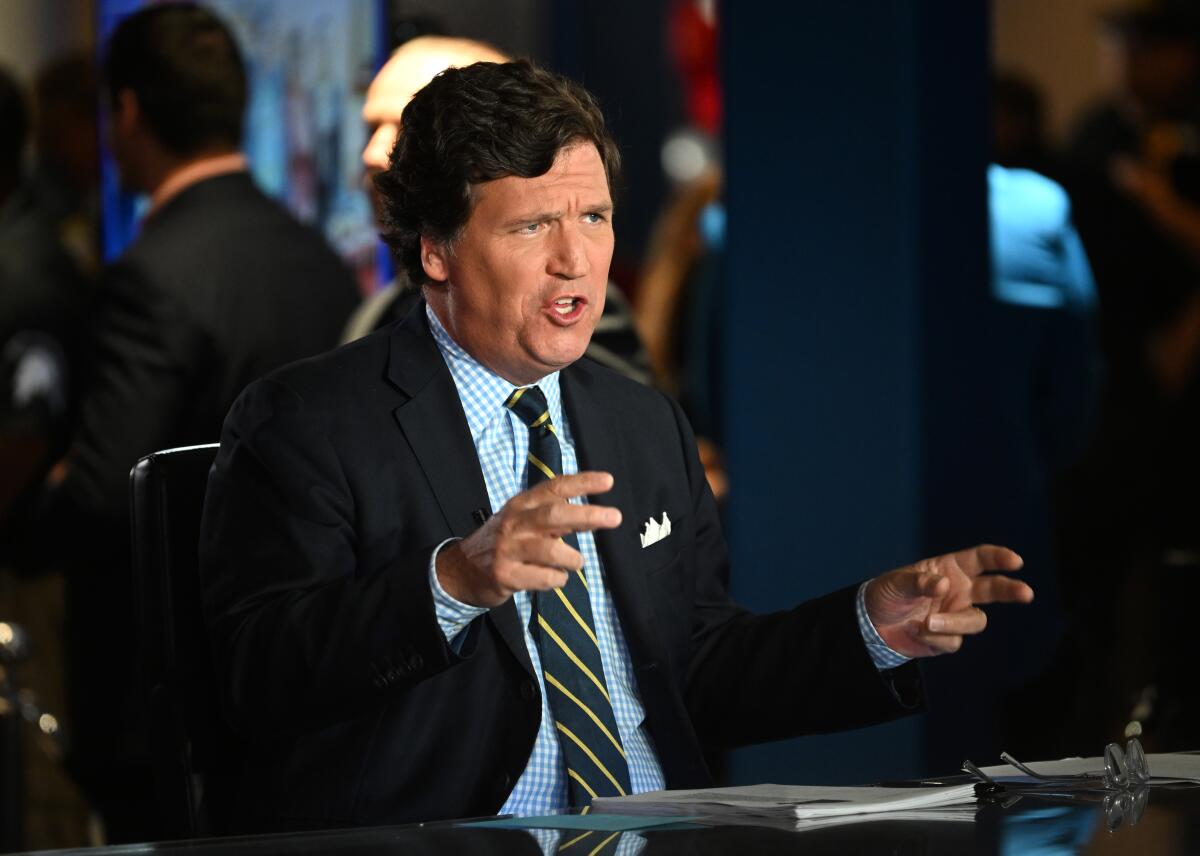Column: Hate Fox News? Too bad — you still have to pay for it

- Share via
Let’s say you hate Fox News.
Maybe you believe that the cable channel’s retailing of baseless claims that the 2020 presidential election was stolen by Joe Biden has damaged democracy.
Maybe you’re repulsed by the open racism voiced by Fox star anchor Tucker Carlson, not to mention his noxious spouting of antimasking and antivaccination claptrap that undermines public health.
Or maybe you believe that Fox’s willingness to feed its audience lies that its executives knew were lies — as suggested by the emails unearthed by Dominion Voting Systems in its $1.6-billion defamation lawsuit against Fox — makes it not a “news” channel at all but a funnel for right-wing ideological mythmaking.
For us, economically, Donald’s place in this election is a good thing.
— Then-CBS chair and CEO Les Moonves chortles over Donald Trump’s role in the 2016 election
You wouldn’t be caught dead patronizing any of Carlson’s advertisers, such as the MyPillow crackpot or the nutritional supplement mountebanks that fill the ad space between Fox News house ads.
That’s your way of boycotting Fox News, perhaps in the hope that the decline of advertising will prompt the channel to change its ways.
Get the latest from Michael Hiltzik
Commentary on economics and more from a Pulitzer Prize winner.
You may occasionally receive promotional content from the Los Angeles Times.
Tough luck. If you’re a cable channel subscriber, you’re almost certainly paying for Fox News, whether you like it or not.
This essential fact about how cable programming works is especially important at the moment for two reasons. One is that the trial of Dominion’s lawsuit is on the verge of starting in a Delaware courtroom.
(The trial was supposed to begin Monday, but the judge has deferred proceedings for a day to give the two sides a crack at an eleventh-hour settlement; if that doesn’t happen, jury selection will be completed Tuesday and opening statements begin.)
The other reason is that negotiations between Fox and several major cable systems over the monthly fees the systems pay to carry Fox News are now underway or will be shortly.
In the past, the cable systems have largely bowed down to Fox’s demands; how the company’s legal headwinds play into those negotiations going forward is anyone’s guess.
Tucker Carlson’s biggest advertisers have abandoned him. Does his show still benefit Fox News?
One might be tempted to call Fox’s reliance on so-called carriage fees the dirty little secret of Fox News’ survival despite the flight of its blue-chip advertisers, except that it’s not much of a secret.
For years it’s been clear that Fox collects far more from what it calls “affiliate fees” than from advertising sponsors. In its most recent financial statement, for the quarter ended Dec. 31, Fox said it collected $1 billion in affiliate fees for its cable programming, but only $451 million from sponsors.
For the most recent full fiscal year ended June 30, Fox collected $4.2 billion in affiliate fees, compared with $1.46 billion in advertising. If advertising on Fox cable channels fell to zero, the segment would still have reported an operating profit of about $1.47 billion.
Fox Corp. doesn’t break out the fees it collects for Fox News specifically, but it’s possible to construct an estimate. The company reported that the news channel had 75 million subscribers as of last June 30.
Industry reports place the fee it collects from the cable operators that carry Fox News at about $2 per cable subscriber per month, which works out to $1.5 billion a year in carriage fees.
These figures don’t mean that 75 million cable viewers regularly tune in to Fox News — that’s just the number of subscribers claimed by the cable systems that carry the channel. A more accurate estimate is that Fox News can claim about 3 million regular viewers. The other 72 million are paying for nothing.
In traditional theories about consumer behavior, people who don’t like or don’t trust a product can vote with their feet, simply by choosing not to buy.
That’s not how things work with cable television. Fox News has notched its impressive subscription figures because cable consumers typically don’t have a choice. Fox News is one of the channels that cable systems treat as a must-have offering and, therefore, bundle it into their basic cable subscriptions. (Among the others are ESPN and CNN.)
It’s remotely conceivable that cable magnates will examine the declining, if not completely evaporated, credibility of Fox as a news channel and decide to play hardball, either by offering smaller carriage fees or taking Fox News off the basic subscription tier entirely.
Racism and antisemitism have become acceptable in public more than at any time in recent memory. Here’s who to blame.
The operative term is “remotely.” The television industry is a thin reed to lean on when it comes to the public interest. Many of its executives are moral black holes. Recall, for example, how Les Moonves, then the chairman and CEO of CBS, giggled and chortled in 2016 over the horrifying inanity of the race for the GOP presidential nomination and its featured star, Donald Trump.
“Man, this is pretty amazing,” Moonves told the audience at a media conference. “Who would have thought this circus would would come to town? It may not be good for America, but it’s damn good for CBS. [Laughs] The money’s rolling in. ... This is fun.”
To peals of laughter, Moonves continued, “This is going to be a very good year for us. Sorry, it’s a terrible thing to say, but bring it on, Donald, go ahead. Keep going. ... For us, economically, Donald’s place in this election is a good thing.” (Moonves left CBS in 2018 after allegations surfaced of him sexually harassing and intimidating female employees.)
The industry’s surpassing love of lucre beyond all else doesn’t only infect political coverage. Southern California sports fans can cast their minds back to the six-year blackout of Dodgers games on most of the region’s pay-TV services starting in 2013.
That’s when the Dodgers’ new owners, led by Guggenheim Partners, reached a 25-year, $8.35-billion deal with Time Warner Cable to create a Dodgers cable channel. Time Warner figured it could make the deal pay by hawking the channel to the other pay-TV outlets in the region.
But Time Warner demanded such a high price for the channel that it received a firm “no” from every other pay-TV system, which included Cox, Charter Communications, the fiber services Verizon FiOS and AT&T U-verse, and the satellite companies DirecTV and Dish. Time Warner Cable served only about 30% of the pay-TV households in the Southland, so Dodger games were effectively blacked out for the other 70%.
The Dodgers held out for the highest price they could get for the TV rights, figuring the team is such a jewel in the Southern California sports crown that the sky was the limit. Time Warner figured it could squeeze the other pay-TV companies for every last dime because, really, what TV service would dare not carry the Dodgers, whatever the price? The answer was: all of them.
The blackout was lifted only after Time Warner Cable merged with Charter to create the Spectrum service. Who lost? The fans, that’s who.
Fox News isn’t the only channel that cable subscribers pay for but don’t watch. Basic cable tiers probably include a majority of channels that the average subscriber never watches and may not even know exist.
For years, consumer advocates maintained that giving subscribers a la carte options from cable menus instead of the one-size-fits-all model would save people money.
Talk of America’s polarization ignores the large majorities that favor abortion rights, COVID restrictions and gun control.
Alas, this nirvana has proved to be a chimera. Streaming channels have peeled off from cable lineups and established their own individualized subscription services, with the result that what used to be bundled together in premium tiers are now separate charges. My own combined monthly bill for streaming services now comes to well more than $100, while my cable bill has risen faster than inflation.
The supine Federal Communications Commission deserves plenty of blame for this. The FCC has waved through cable mergers, including the Time Warner-Charter deal and Comcast’s acquisition of NBCUniversal, that have achieved nothing but the shrinkage of consumer choice.
What choices do consumers have regarding Fox News? Not many, if any. The progressive media watchdog Media Matters for America is pushing an “Unfox my Cable Box” grass roots initiative, but it’s too early to say if it has any traction.
Consumers can cancel their cable subscriptions and turn to external antennas to receive local broadcast channels, but the betting here is that it will be a long time before the decline in cable subscribers is large enough to force cable executives to reconsider their basic tier offerings. The FCC might be able to impose consumer choice on cable systems by regulation, but that’s a slow process even under the best circumstances, and would surely come under a years-long legal attack from the industry.
Still, consumers shouldn’t stay silent. Cable executives have kowtowed to Fox News in the past because its viewers have tended to speak with a single voice, backed by right-wing politicians; losing access to the channel would surely provoke an outcry from people with megaphones.
When DirecTV (which is part-owned by AT&T) announced last year that it would drop the right-wing channel OAN, six red-state attorneys general accused the satellite service of bowing to “powerful left-wing voices.” DirecTV dropped it anyway.
But OAN is a relatively small player. Fox News is not. Moreover, having been founded in 1996, it has been a fixture on cable TV for the better part of a quarter-century. That makes it harder to excise.
But not impossible. Those who find the presence of Fox News on their cable menus detestable should let their cable operators know it. If the Dominion lawsuit resumes Tuesday, more evidence of the cable channel’s irresponsible promotion of false antidemocratic claims may emerge. Another lawsuit against Fox, a $2.7-billion claim filed in New York by the voting machine company Smartmatic, is in the offing, and could pile on further allegations.
At some point, cable executives may find that the drawbacks of keeping Fox News on basic cable outweigh the benefits of keeping it on. If those can be translated into dollars lost because subscribers are going away, maybe the cable firms will act in a way that serves, rather than undermines, the public interest, by kicking Fox News to the curb.
More to Read
Get the latest from Michael Hiltzik
Commentary on economics and more from a Pulitzer Prize winner.
You may occasionally receive promotional content from the Los Angeles Times.














